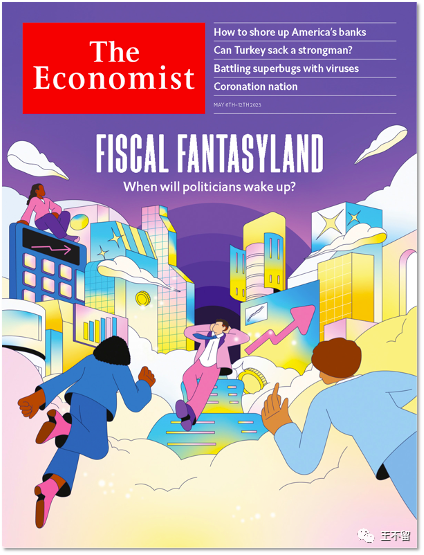
本篇来自《经济学人》(The Economist)2023年5月6日社论(Leaders)精选:《病毒,有时对人体是有益的》(When viruses are good for you)。
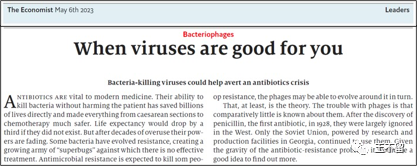
Bacteriophages
噬菌体
When viruses are good for you
病毒,有时对人体是有益的
As antibiotic resistance spreads, bacteriophages could help avert a crisis
随着抗生素耐药性的蔓延,噬菌体可能有助于避免危机
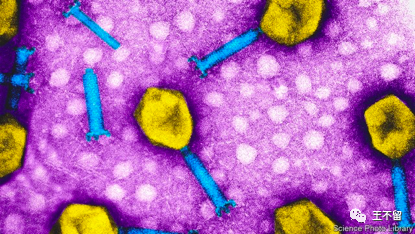
Antibiotics are vital to modern medicine. Their ability to kill bacteria without harming the patient has saved billions of lives directly and made everything from caesarean sections to chemotherapy much safer. Life expectancy would drop by a third if they did not exist. But after decades of overuse, their powers are fading. Some bacteria have evolved resistance, creating a growing army of “superbugs” against which there is no effective treatment. Antimicrobial resistance is expected to kill 10m people a year by 2050, up from around 1m in 2019.
抗生素对现代医学至关重要。它们可以在不伤害患者的情况下杀死细菌,这种能力直接挽救了数十亿人的生命,并使从剖腹产到化疗的一切过程都变得更加安全。如果没有抗生素,人类的预期寿命将下降三分之一。但是经过几十年的过度使用,它们的效用正在减退。一些细菌已经进化出耐药性,形成了越来越多的“超级病菌”,对于它们目前尚无有效的治疗方法。预计到2050年,抗菌素耐药性每年将导致1000万人死亡,高于2019年的约100万人。

《经济学人》周报2022年1月22日亚洲专题文章:与超级细菌作斗争——耐药性感染每年导致近130万人死亡
It would be unwise to rely on new antibiotics to solve the problem. The rate at which resistance emerges is accelerating. Some new drugs last only two years before bacteria devise countermeasures. When new antibiotics do arrive, doctors often hoard them, prescribing them only grudgingly and for short periods when faced with the most intransigent infections. That helps limit the spread of resistance to new drugs. But it also limits sales, making new antibiotics an unattractive proposition for most pharmaceutical firms.
依靠新的抗生素来解决这个问题是不明智的。耐药性出现的速度正在加快。一些新药的药效在病菌产生耐药性之前只能持续两年。即使有了新的抗生素,医生通常也会把它们储藏起来,只有在面对最顽固的感染时,才勉强开一些短期处方。这有助于限制对新药耐药性的传播。但这也限制了销售,使得新抗生素对大多数制药公司来说没有吸引力。
Governments have been trying to fix the problem by funnelling cash into research and taking stakes in drug firms. That has produced only limited improvements. But there is a promising, if obscure, alternative that is also worth a look. Microbiologists have known for decades that disease-causing bacteria can suffer from illnesses of their own. They are susceptible to attack by bacteriophages (“phages” for short): specialised viruses that infect bacteria, and often kill them.
各国政府一直试图通过向相关研究注入资金和入股制药公司来解决这个问题。这只产生了有限的改进。但是,有一个有前途的,虽然鲜为人知的替代方案也值得一看。几十年来,微生物学家已经知道致病细菌自身也会患上疾病。它们容易受到噬菌体的攻击(bacteriophages可简写为phages),噬菌体是专门用来感染病菌并经常能把它们杀死的病毒。
Using one disease-causing organism to fight another has several advantages. Like antibiotics, phages are picky in their choice of target, leaving human cells alone even as they infect and destroy bacterial ones. Unlike antibiotics, phages can evolve just as readily as bacteria can, meaning that even if bacteria do develop resistance, the phages may be able to evolve around it in turn.
使用一种致病生物来对抗另一种致病生物有几个优点。像抗生素一样,噬菌体在选择靶标时也很挑剔,它们可以感染并破坏病菌细胞,但却不会把人类细胞作为靶标。与抗生素不同的是,噬菌体可以像细菌一样易于进化,这意味着即使病菌确实产生了耐药性,反过来噬菌体也会在其周围进化。
That, at least, is the theory. The trouble with phages is that comparatively little is known about them. After the discovery of penicillin, the first antibiotic, in 1928, they were largely ignored in the West. Only the Soviet Union, powered by research and production facilities in Georgia, continued to use them. Given the gravity of the antibiotic-resistance problem, it would be a good idea to find out more.
至少,在理论上是这样的。噬菌体存在的问题在于,人们对它们知之甚少。在1928年发现第一种抗生素青霉素(盘尼西林)后,它们在西方基本上是不被重视的。只有苏联在格鲁吉亚的研究和生产设施的支持下继续使用它们。鉴于抗生素耐药性这个问题的严重性,对它们进行持续研究是个不错的主意。
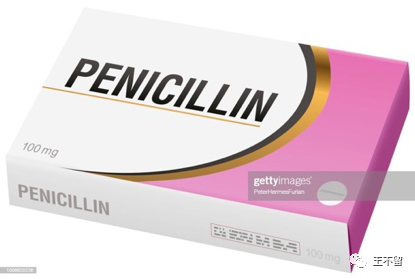
The first step is to run more clinical trials. Interest from Western firms is growing. But it is being held back by the fact that phages are an even less appealing investment than antibiotics. Since they are natural organisms there may be trouble patenting them, making it hard to recoup any investment.
第一步是进行更多的临床试验。西方公司正表现出越来越浓厚的兴趣。但是也受到这样一个事实的阻碍,即噬菌体是一项比抗生素更不吸引人的投资。由于它们是天然生物,因此在申请专利方面可能会有麻烦,从而很难收回任何投资。
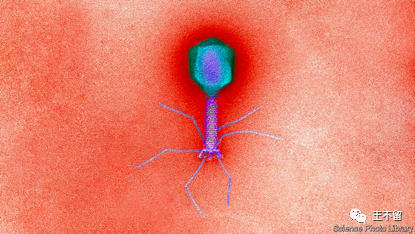
《经济学人》周报2023年5月6日科技栏目文章:抗生素危机——西方公司对苏联药物越来越感兴趣:“噬菌体疗法”旨在利用病毒治愈细菌感染
Governments can help. They could fund basic research into phage therapy, and clarify the law around exactly what is and is not patentable. In time they could set up phage banks and manufacturing processes, so as to make production cheaper. And they could spread awareness of the risks of overusing antibiotics, and the potential benefits of phages. If you are put off by the thought of ingesting a virus, consider that penicillin was a mould.
各国政府可以提供支持。他们可以资助噬菌体疗法的基础研究,并在法律上澄清具体什么可申请专利,什么不可申请专利。随着时间的推移,他们可以建立噬菌体库和制造工艺,从而实现低成本生产。他们也可以让更多人认识到过度使用抗生素的风险,以及噬菌体疗法的潜在益处。如果摄入病毒的想法让你退避三舍,那么,你有没有想过青霉素还是一种霉菌呢。
Going viral
推进病毒利用
The history of antibiotics themselves shows that governments can help nudge the private sector into action. Penicillin was largely ignored at first by doctors, who regarded it as too difficult to produce. It took the tragedy of the second world war, and the intervention of the American and British governments, to kickstart the modern antibiotics industry. Compared with a war, antibiotic resistance is a slow-burning problem. Nonetheless, the time to act is now.
抗生素本身的历史表明,政府可以帮助推动私营部门采取行动。起初,青霉素在很大程度上也被医生忽视,他们认为它太难生产了。第二次世界大战的悲剧,以及美国和英国政府的干预,才启动了现代抗生素行业。与战争相比,抗生素耐药性并非迫在眉睫的问题。尽管如此,现在也是该采取行动的时候了。




















 225
225











 被折叠的 条评论
为什么被折叠?
被折叠的 条评论
为什么被折叠?








